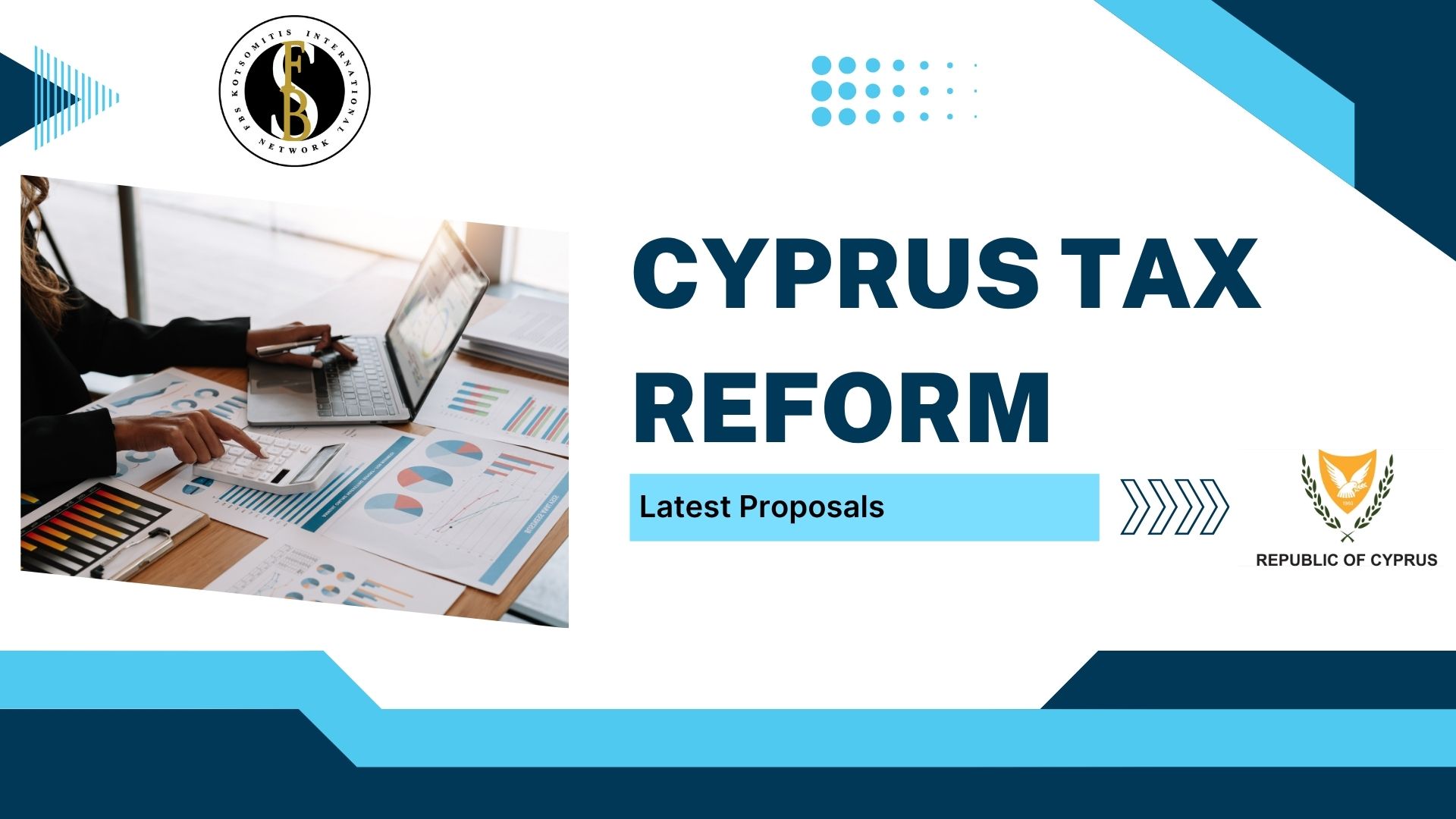Cyprus Tax Reform Introduction

The Cyprus Government has announced a series of comprehensive tax reform proposals to strengthen Cyprus’ tax base whilst retaining tax incentives in accordance with the global tax initiatives put forward by the OECD BEPS Actions and the UN International Tax Framework Convention.
The proposed tax reforms, presented by the Economic Research Center of the University of Cyprus (CypERC), include a series of significant proposals aimed at strengthening Cyprus’ tax policy.
The proposals will enter an additional three-week public consultation period. After this, the Ministry of Finance will prepare the legislative bills for submission to the House of Representatives for a vote.
Some of the measures could be implemented during 2025, while it is most likely that the measures could take effect in 2026.
It has been more than 20 years since Cyprus last undertook a major tax reform, reflecting the country’s ongoing commitment to maintaining its status as a leading international financial hub.
It is important to note that some of the topics outlined above may ultimately be excluded from the final tax reform package or they could be revised before being enacted into law.
What are the main Cyprus Tax Reform Proposals?
Cyprus Corporate Tax
Increase in Cyprus Corporate Tax
Increase of the corporate income tax rate from 12.5% to 15% for all companies.
Extending the Loss Carry-Forward Period
Tax losses could be carried forward for up to 10 years, compared to the current 5-year limit. However, losses carried forward beyond 5 years would be subject to a cap based on a percentage of the company’s taxable profit for the relevant year. The existing group loss-relief provisions would remain unchanged, meaning no fiscal unity is to be introduced.
Tax Depreciation on Used Buildings
Depreciation will be calculated based on the purchase cost incurred by the new owner. Additionally, buildings that undergo a green energy upgrade may be eligible for a renewal of their depreciation period.
Non-Domicile Status
The plans propose maintaining the current 17-year non-domicile status, with the possibility of extending it upon payment of an annual fee.
Taxation of Cryptocurrency Profits
Profits from cryptocurrency trading will be subject to taxation if classified as revenue in nature.
Special Defense Contribution (SDC)
- Reduction of the SDC rate on dividends to decrease from 17% to 5% for individuals who are tax residents and domiciled in Cyprus.
- Abolition of 3% SDC on rental income for companies and individuals who are tax residents and domiciled in Cyprus.
Note: The above does not apply to individuals with non-domestic status, as SDC applies to individuals who are tax residents as well as domiciled in Cyprus.
Green Transition and Digital Transformation
- Businesses undertaking investments in green transition and digital transformation will be eligible for super deductions on qualifying expenditures, along with accelerated depreciation benefits.
- Expenditures on staff retraining and upskilling will be tax-deductible, enabling businesses to adapt more effectively to evolving industry demands.
Deemed Dividend Distribution Rules
- Abolition of the deemed dividend distribution regime.
- Introduction of a 5% withholding tax on actual dividend payments for individuals who are both tax residents and domiciled in Cyprus.
- An anti-avoidance provision, applying a higher withholding tax rate to disguised dividend distributions, following the Estonian model.
Measures Against “Closely Held Companies”
- Empowerment to lift the corporate veil and tax shareholders as individuals engaged in business activities.
- Authority to align reported salaries with prevailing market rates.
Existing beneficial provisions will be retained for the following:
- Notional interest deduction (NID) for corporate equities;
- IP Box Regime;
- Tonnage tax regime for eligible shipping income;
- Exemption on the sale of shares / other securities;
- Current group relief rules;
- Dividend exemption rules;
Other
- Strengthening the tax residency criteria for companies (based on management and control).
- New anti-abuse provisions will apply to companies with five or fewer shareholders.
- Abolishing the 1.5% insurance premium tax
- Implementation of a framework for intangible assets (IP Box)
- Stamp duty – elimination of stamp duty’s horizontal imposition. Stamp duty will only be applied to agreements involving real estate, banking and insurance.
Cyprus Personal Income Tax
The key Cyprus personal tax reform proposals are outlined below.
- Increase in the tax-free personal income threshold by €1.000, increasing it from €19,500 to €20.500 per year.
- Amendments to intermediary bands with the shifting of the highest tax rate of 35% applicable to taxable income of over €80.000.
- Tax deductions for household income criteria, for households with two working partners / spouses where the combined gross annual income of both spouses is not over €80.000:
a. €1.000 for each spouse / partner for every child under 19 (for females) and under 21 (for males).
b. €1.000 for each spouse / partner for every student under 23 (for females) and under 25 (for males).
c. Up to €1.500 per spouse / partner for mortgage installments or rent of the primary residence.
d. Up to €1.000 per spouse / partner for green household upgrades (for example, photovoltaic systems, energy upgrades, electric cars etc) in the year the upgrade was completed for 5 years.
e. Single-parent families will be classified under the most favourable scenario (ie as families with two working parents).
Cyprus Tax Brackets / Rates:
| Current Taxable Income | Tax Rate | Revised Taxable Income | Tax Rate |
|---|---|---|---|
| €0 – €19.500 | 0% | €0 – €20.500 | 0% |
| €19.501 – €28.500 | 20% | €20.501 – €30.000 | 20% |
| €28.501 – €36.300 | 25% | €30.001 – €40.000 | 25% |
| €36,301 – €60.000 | 30% | €40.001 – €80.000 | 30% |
| €60.001 and above | 35% | €80.001 and above | 35% |
Retaining and Strengthening Tax Residency Criteria for Individuals:
- Retention of the 183-day in Cyprus rule.
- Strengthening of the 60-day rule – expansion of the definition to include individuals whose centre of business interests is in Cyprus, irrespective of their actual physical presence.
- An additional tax residency test based on the “centre of business interests,” that will not require physical presence in Cyprus.
- The Double Taxation Avoidance Agreement’s provisions for resolving dual tax residency difficulties.
Additional Personal Allowances
Additional personal allowances will be provided for families with children / students, individuals with housing loans or rental obligations, as well as families who executed “green” household upgrades.
Other
- Retention of worldwide income with exceptions / deductions.
- Retaining the deduction of expenses for generating taxable income.
- Retention of the 50% exemption on employment income for an individual’s first employment in Cyprus.
- Lowering the tax rate applied to employee stock options, subject to anti-abuse provisions.
- Ex gratia payments to employees will be taxed only if they exceed a certain threshold, but employers will be able to fully deduct the expense.
- “Handshake payments” (substantial sums offered by employers to attract key recruits) would be taxable to the employee and fully deductible by the employer.
- Deductible cultural donations.





